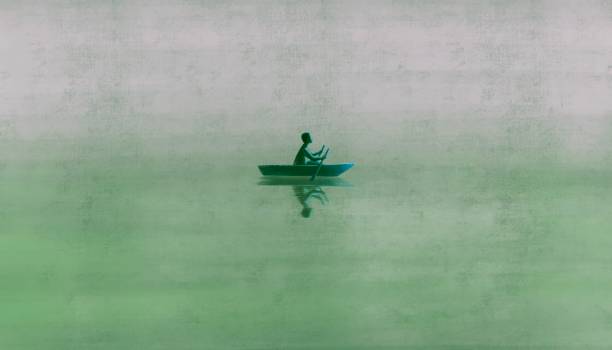By Rowjatun Janna
Waves upon waves, blue over blue, tainted water meeting the sparkling sky at the horizon far away.
On the vast sea, wooden boats float like mismatched patches of fabric kilted on an unwashed blue saree.
On one of these boats, Miraj lives with his parents and grandma. When he was a little boy, his grandma used to tell him tales of the land—of a house made out of clay, of cattle and trees, of solid ground under their feet, of people digging up the ground to find water. Now grandma is too sick to tell him any of these old stories, or can hardly remember who Miraj is. No matter, Miraj didn’t believe in those fairy tales, anyway! Earth is only for greens, humans have no place there! Even dreaming of taking up the space that nurtures greeneries and humans in turn, is nothing but audacity. Who could believe tales of land, of houses made out of clay, when all they ever saw from birth were vast sheets of water—being polluted by them and polluting them in return.
Among the flowing blue, Miraj cuts through the clear lines of waves by paddling on a plastic drum—a one-man makeshift raft. He paddles and paddles, inching closer to the center of the floating community, with harsh sunbeams burning his skin through the journey. The center is a two story boat—a luxury among the peasants surrounding them. The whole boat is a bazaar, selling goods imported from the closest Land-Farm. Miraj climbs on the boat and sets to find banana plantains, and he looks for the ones with slight defects and discolored trunks—clean, healthy trunks would be too expensive for his family, anyway. As one of the essentials of building floating structures, banana plantains are worth their weight in gold. But Miraj has no choice but to haggle for even a slight discount—Grandma, from her deathbed, is forcing his hands.
Rowing back home, Miraj catches the current, and the raft of plastic and banana trunk drifts towards his home by itself. He lies on the trunks, with his back to the swaying coolness and eyes to the sky, and all he sees is a dome of blue. The sky looks distorted, as if Miraj is a fish, and he’s looking at the sky from underwater.
Miraj’s trance is broken as his raft bumps gently to his home and Mom’s cries float from their tiny wooden boat to his ears. It’s been months since Grandma has been deathly ill, but death had refused to visit their shabby floating home so far.
Miraj gets up from the deck and walks inside the shaded boat, standing beside Father. Miraj has always admired Father, the strong and reliable man who kept their family together even when it felt as if the world was going to end. But today, Miraj looks at Father’s face as he sits beside Miraj’s dying grandma, and sees misery painted on his expression.
From the tiny bed with the smell of disease and old age, Grandma speaks in a broken voice, her throat squeaking from the grip of age.
“Child, do not forget to bury me beside your father.” She utters with halting breath, her bony fingers holding onto her son’s hand with every last bit of her strength.
Father lies through his teeth, tears glistening in his eyes. “Don’t you worry mom, I will have your grave bracketed with bamboo and Hasnahena. You will be in a garden with Dad.”
Mother stands on the other side of the tiny bed, her face clouded with sorrow and helplessness. It has been decades since the land they lived in disappeared into the belly of the ocean—their house, their wealth and the graves of their ancestors. Even living, breathing humans had been caught in the climate’s trap; who cared about graves at that point?
Miraj stares, and listens to Father paint the most beautiful image of a grave with his words, and thinks to himself, what a waste!
He stares at Mother, and sees the tears rolling down her cheeks. He can tell she is thinking about how many banana trunks it would take to create a semblance of a grave for her mother-in-law, and calculating the price of it all—he can tell from the worry on her face. Miraj quietly stands among them–almost invisible–and thinks, what a waste!
Even the wealthiest people can’t live on the land anymore, the earth now too precious to waste with such trivial use. How can someone even think of being buried in a grave? Miraj shakes his head. Burying the dead in land? Bah.
What a waste, what a waste.

